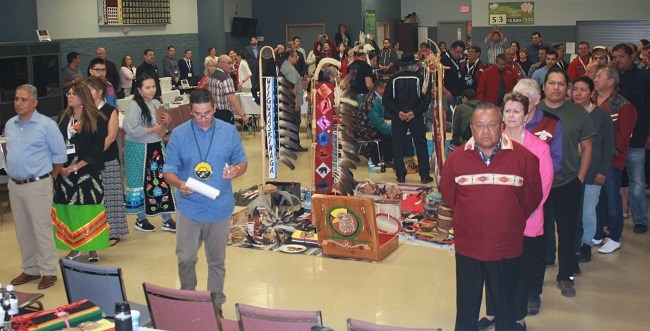Glen Hare has been elected as the new grand council chief of the Anishinabek Nation.
Hare was elected by Anishinabek Nation chiefs during a traditional standup election in Fort William First Nation on June 6. Hare was elected over Franklin Paibomsai, chief of Whitefish River First Nation.
“I’m looking forward to it,” Hare said in a news release. “I love what I do.”
Hare replaces Patrick Madahbee, who announced he would not seek re-election this year after serving three consecutive terms as grand council chief.
Hare had just completed his fourth consecutive term as deputy grand council chief of the Anishinabek Nation, and previous to that, served in local politics in his home community of M’Chigeeng First Nation on Manitoulin Island and at the regional level.
Among Hare’s priorities are synchronized elections, something his predecessor had also championed. Currently, Indigenous communities vote for a new chief and council every two to three years.
“Let’s work that out. We’ll be so much stronger,” he said. “We have elections coming up tomorrow in this province, we have to stand together whichever way it goes. I will travel night and day for you chiefs, for your communities and your citizens.”
The election also ushered in a new government structure within the Anishinabk Nation.
In previous terms, there has been one deputy grand council chief position; however, in this election and moving forward, there will be four regional deputy grand council chiefs, which the Anishinabek Nation said is expected to allow for greater capacity and political representation at the regional level.
The regions and their newly elected chiefs are:
- Northern Superior Region: Chief Edward Wawia, Red Rock Indian Band
- Southwest Region: Joe Miskokomon (acclaimed), Chippewas of the Thames First Nation
- Southeast Region: Chief Jim Bob Marsden (acclaimed), Alderville First Nation
- Lake Huron: Chief Scott McLeod (interim), Nipissing First Nation
The Anishinabek Nation is the political advocate for 40 member communities across Ontario, representing approximately 60,000 people. The Anishinabek Nation is the oldest political organization in Ontario and can trace its roots back to the Confederacy of Three Fires, which existed long before European contact.




